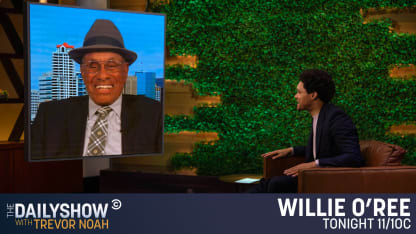"When I was 14 years of age, I decided I wanted to become a professional hockey player and then hopefully, one day, play in the National Hockey League," he said on the show. "I started playing organized hockey at 14. I left my hometown to go up to Quebec, Canada to play junior hockey. I played there for one year and then I went to play in Ontario the second year, and that's when I had an unfortunate accident."
O'Ree sustained an eye injury after being struck by a puck during a game with the Kitchener-Waterloo Canucks in the 1955-56 season. He told Noah he lost 97 percent of his vision in his right eye.
"The doctor told me I'd never play hockey again, but I kept it a secret and turned pro and was able to play 21 years with one eye," O'Ree said.
O'Ree played two seasons in the NHL, the second during the 1960-61 season. His long professional career was mostly played in the Western Hockey League (WHL) with the Los Angeles Blades and San Diego Gulls.
But, as he told Noah, it started with a secret.
"When I went to the hospital and I was in my recovery room and the doctor said, 'Mr. O'Ree, you're going to be blind and you'll never play hockey again.' The two goals I had set for myself seemingly were gone," O'Ree said.
Within five weeks of leaving the hospital, he was back on the ice. O'Ree said he had to compensate for his newly-impaired vision and, as a player with a left-handed shot who played left wing, had to turn his head all the way right and look over his shoulder constantly to follow the puck and pick up on plays.
"Consequently, I was over skating the puck and missing the net and I just said, 'Willie, forget about what you can't see and concentrate on what you can see.' So, the [junior hockey] season ends and I go back to my hometown and I kept my fingers crossed that I'd be contacted by a professional team and I waited and waited and finally I got a call."
Midway through his second season at Quebec, O'Ree was called up to the Bruins to replace an injured player. He made his NHL debut Jan. 18, 1958.
O'Ree's career is one of perseverance.
When he first became a professional hockey player, O'Ree said he faced a lot of criticism, but kept his head down, worked hard and trusted his ability on the ice to talk for him.
"It was really rough at the beginning, but finally I gained the respect of the players and the fans," O'Ree said.
His career inspired young players of all races.
"I met a lot of the Black players and the players of color that are playing in the present time and some of them that I've met, they've said, 'Willie, I just can't imagine what you had to go through to make it possible for players like me to play in the League,'" O'Ree said. "I have the highest respect and admiration for you. You must have had to turn your cheek 1,000 times.'"
More or less, but O'Ree persisted hoping no player of color would have to do the same.

